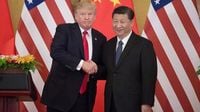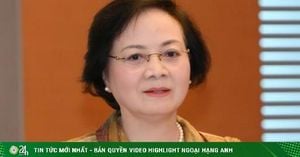In the modern world, the economy cannot be separated from politics, and likewise, politics cannot ignore the role of powerful leaders. One individual who has recently created significant ripples in the global political economy is Donald Trump, the 47th President of the United States from the Republican Party. His return to the White House, dubbed "Trump 2.0," comes with even more aggressive ideas!
Today, MGR Online takes readers through insights from Associate Professor Dr. Vichit Boonprong, Deputy Dean for Academic Affairs at the Faculty of Political Science, Ramkhamhaeng University, discussing "Global Political Economy and Trump 2.0," to answer why one person can shake the world so profoundly!
In just 100 days of his new term, Trump has caused significant turmoil both domestically and internationally. Under the familiar banner of "America First," which emphasizes protecting national interests, he has pushed for a nationalist economic agenda, tax cuts, and trade barriers. At the same time, he has become stricter on issues like immigration, pushing for the construction of a border wall, confronting China, and reforming domestic bureaucracies and justice systems. One of the most impactful measures has been the imposition of high tariffs on imports, especially from China, marking the highest import tariffs in U.S. history. This has resulted in rising prices for consumers and could lead to retaliatory tariffs from other countries, potentially igniting a protracted trade war.
Dr. Vichit emphasizes that the U.S. has acted as the "global police" or "world order organizer," maintaining its leadership status since the end of World War II. The U.S. has played a crucial role in dismantling Soviet power and curbing Japan's growth as an economic competitor. Thus, the U.S. has been confident in its ability to control and dictate world order until the paradigm shifted with China's significant economic rise.
He notes, "Trump's strategic team likely assessed that continuing under the old world order would only lead to losing the U.S.'s number one status. Simply put, they control the rules of the game but are losing to new players."
As a result, Trump's strategy to reorganize the world through measures like tariff barriers and various policies under the "America First" initiative has left many countries struggling to adapt. The U.S. can change rules at will, which raises concerns and worries among various parties about how to respond to these new challenges.
Regarding global security, Dr. Vichit points out that the U.S. continues to play a leading role in maintaining world stability. Trump's return may lead to a quicker resolution of the Russia-Ukraine conflict, as he appears less supportive of the current stance and recognizes Vladimir Putin's role in maintaining global power balance. The U.S. might reconsider its policy of supporting Ukraine, as continuing on the same path could negatively impact the U.S. economy in the long run.
Trump's first term clearly demonstrated his discontent with the U.S. bearing the primary burden of supporting NATO alone, calling for allies to take more responsibility and invest more. This has led to significant budget reductions in this area.
Dr. Vichit views the current actions of the U.S. as reflecting the 'Zero-Sum Game' theory, where the winner takes all, and the opponent loses. The U.S. tries to uphold moral and ethical standards while exercising absolute power through diplomacy and direct economic measures. This is leveraging its economic strength, robust financial systems, global market control, and superior military and technological capabilities.
He explains that the Zero-Sum Game theory illustrates the U.S.'s desire to maintain its status as the world's number one power. The notion of a Win-Win Solution is merely rhetoric. The only way to counterbalance U.S. power is through creating a multipolar system or strategic partnerships in economics, security, politics, or environmental matters.
Thailand is also affected! The tariff war shakes ASEAN's economy. The tariff measures signify the beginning of a trade war between the two economic giants, the U.S. and China, impacting global trade, including Thailand. While Thailand may seem like an observer, Dr. Vichit asserts that the country will undoubtedly feel the repercussions!
"I believe that the instinct of a businessman, if they continue to play this game, will surely shake the world. It could lead to decisions by other nations on which side to choose, whether to align with the U.S. or turn to the new leader, China. This will certainly impact the ASEAN region, especially Thailand, which finds itself in a position of needing to tread carefully in choosing sides. Thailand should present proposals that the U.S. sees as it remains a strategic player in this area, while also maintaining a balanced stance to protect its interests with both the U.S. and China," he says.
Dr. Vichit highlights that the high tariffs, particularly the 145% retaliatory measures against China, vary based on each country's strategic closeness to the U.S. Countries like the UK or Singapore face much lower tariffs of around 10%. Meanwhile, Thailand stands at 36%, Vietnam 46%, and Cambodia 49%, indicating a need for Thailand to assess how it is perceived regarding its closeness to China.
He notes that countries that proactively engage with the U.S. often receive two main proposals: arms sales and opening markets for U.S. agricultural products. For Thailand, the 36% tariff raises questions about potential impacts, especially on agricultural products that have historically played a significant role in exports to the U.S.
Dr. Vichit believes that Thailand's agricultural sector will inevitably face challenges, particularly among large enterprises with international ties. Thai agricultural products, which previously had a competitive edge in the U.S. market, may encounter intensified competition. Concurrently, China, facing U.S. retaliatory measures, is using this situation to export agricultural products globally, leading to direct competition with Thailand, given China's lower production costs and market flexibility.
He warns that if Thailand does not adequately adjust its strategies, it may face long-term repercussions. "China has sufficient resources to respond to the U.S. and may initially feel the impact, but in the long term, China is poised to dominate the market entirely. Other agricultural competitors will also impact Thailand's market share, making it increasingly difficult for local farmers to sell their products. This is a significant concern for the future."
Nonetheless, Dr. Vichit predicts that ultimately, the U.S. will need to adjust its stance once it achieves its desired benefits, suggesting that pressures will lead to a return to a more familiar atmosphere.
The phenomenon of Donald Trump is not just a distant political event; it serves as a critical case study. This is why the Faculty of Political Science at Ramkhamhaeng University has designed its curriculum to address modern global challenges. Dr. Vichit notes that the faculty is among the first private higher education institutions in the country to offer comprehensive political science programs at the bachelor's, master's, and doctoral levels, aiming to produce well-rounded graduates who understand Thailand's social context amid transitions.
At the undergraduate level, the focus is on developing students to be knowledgeable and aware of the changing social context and adapting to globalization trends, emphasizing "Glocalization"—a blend of globalization and localization. This means that as the world shrinks, local contexts are integrated into capitalist systems and change. At the same time, it stresses the importance of fostering awareness of democratic values, equality, and respect for diversity.
The curriculum also promotes experiential learning through internships with significant domestic and international organizations, such as embassies, consulates, government agencies, and leading private sector organizations. "We believe that learning through real-world experiences is crucial. While professors can provide knowledge in the classroom, real experiences teach students valuable lessons," he explains.
For master's students, the program emphasizes both theory and practice, providing opportunities for field visits and exchanges with experts in various fields. Students are also required to conduct independent research, honing their research and analytical skills. This program is open to those without a political science background, fostering diverse perspectives in the learning environment.
For those interested in pursuing doctoral studies, the focus shifts to governance and political administration, emphasizing critical processes, debate, and systematic exchanges of ideas. This approach encourages mature learning through critique and expression in political science.
Dr. Vichit highlights that the master's and doctoral programs are strengths of the faculty, as most students are successful professionals. The bachelor's and master's programs at Ramkhamhaeng University are recognized as some of the best in the private sector, producing graduates who play crucial roles in various sectors, including politicians, high-ranking officials, and independent organization staff, reflecting the quality of education provided.
As the world evolves, the study of political science must stay ahead. The curriculum is updated every five years to align with societal and global changes, incorporating new courses that respond to current trends, such as digital politics, which focuses on understanding the role of digital technology in political processes, political communication, and information verification.
Additionally, courses on political leadership are particularly interesting, as they emphasize understanding Thailand's social context through case studies of successful political role models who engage with students in class discussions. The curriculum integrates knowledge from various disciplines, including economics, psychology, and related fields, to enhance analytical thinking and adaptability to rapidly changing global contexts.
In summary, Ramkhamhaeng University's Faculty of Political Science has produced graduates who have made significant contributions across various sectors, demonstrating the quality of education and the capabilities of its students. "Finally, we invite everyone to join the 'Singh Ramkhamhaeng' family. Our 'Singh' is a 'copper lion,' symbolizing the first metal known to humanity for practical use. We welcome applications at any time and are eager to embrace everyone!" concludes Dr. Vichit.




